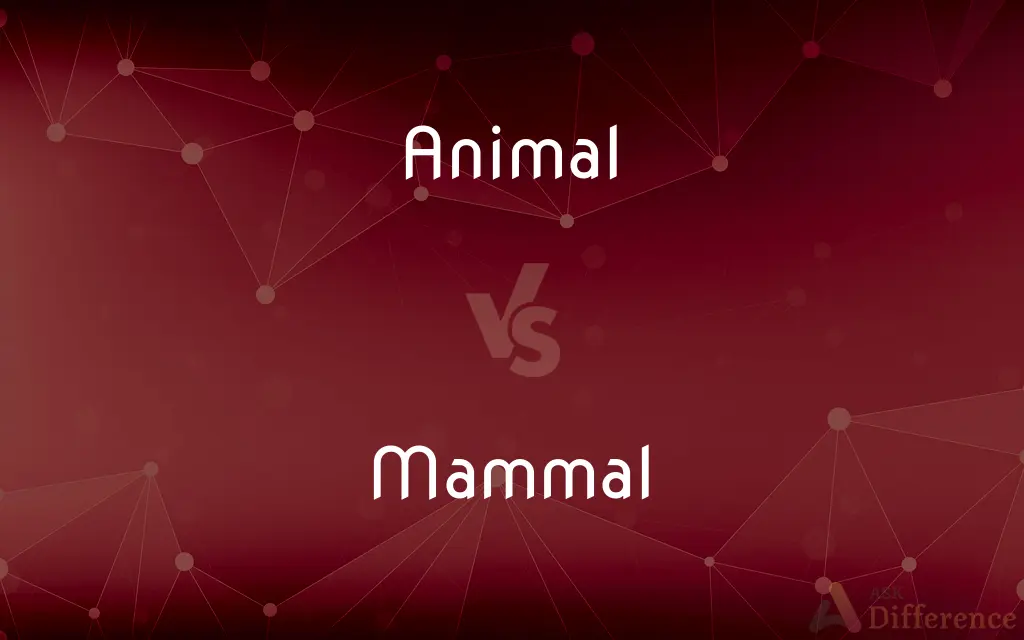Animal vs. Mammal — What's the Difference?
Edited by Tayyaba Rehman — By Maham Liaqat — Updated on March 20, 2024
An animal is any living organism that moves, consumes organic material, and has senses. A mammal is a specific class of animals characterized by warm-bloodedness, hair or fur, and, in females, milk-producing mammary glands.

Difference Between Animal and Mammal
Table of Contents
ADVERTISEMENT
Key Differences
The term "animal" encompasses a vast kingdom of living organisms, Kingdom Animalia, which includes creatures as diverse as insects, birds, fish, reptiles, mammals, and many others. On the other hand, mammals represent a specific class within this kingdom, known as Mammalia. Mammals are distinct for their warm-blooded nature, the presence of hair or fur on their bodies, and the unique ability of mammalian females to produce milk from mammary glands to nourish their young.
One of the main distinctions between animals and mammals is the breadth of the categories they represent. While "animal" refers to a broad kingdom, "mammal" specifies a class within that kingdom, signifying a more focused grouping with shared characteristics. In contrast, the animal kingdom encompasses every multicellular organism that can move and react to its environment, including those that lay eggs, breathe through gills, or have body structures vastly different from mammals.
The criteria for classification further differentiate animals and mammals. For animals, the key criteria include mobility, sensory perception, and heterotrophy (consumption of organic matter). Mammals, however, are specifically categorized by physiological and anatomical features such as endothermy (warm-bloodedness), hair or fur, and the presence of mammary glands. This distinction highlights the evolutionary adaptations that enable mammals to inhabit a wide range of environments on Earth.
Reproduction is another area where mammals stand out from other animals. While animals as a whole employ a variety of reproductive strategies, including egg-laying and external fertilization, mammals are characterized by internal fertilization and, with few exceptions, live birth. The development of the placenta in most mammals allows for a more direct nurturing environment for the developing embryo, a feature less commonly found in other animal classes.
In terms of habitat and adaptability, while animals can be found in nearly every environment on the planet, from the deepest oceans to the highest mountains, mammals have developed unique adaptations that allow them to thrive in extreme conditions. For example, mammals have developed insulating body coverings, such as fur and blubber, and complex behavioral adaptations for survival in diverse climates, showcasing the specialized nature of this class within the broader animal kingdom.
ADVERTISEMENT
Comparison Chart
Definition
Living organisms that move, consume organic material, and have senses
Warm-blooded animals with hair or fur, and mammary glands for producing milk
Kingdom/Class
Kingdom Animalia
Class Mammalia within the Animal Kingdom
Characteristics
Mobility, sensory perception, heterotrophy
Warm-blooded, hair or fur, mammary glands, internal fertilization, mostly live birth
Examples
Insects, birds, fish, reptiles, mammals
Humans, dogs, cats, whales
Reproduction
Varied, including egg-laying and live birth
Mostly live birth, with internal fertilization
Physiological Features
Depends on the specific class or species
Endothermy, presence of hair or fur, mammary glands
Habitat
Diverse, across all ecosystems
Adapted to a wide range of environments, including extreme conditions
Evolutionary Traits
Varies widely across the animal kingdom
Specific adaptations like insulating body coverings and complex behaviors
Compare with Definitions
Animal
Exhibits diverse reproductive and survival strategies across species.
Frogs lay eggs in water, where their larvae, tadpoles, develop.
Mammal
Characterized by internal fertilization and mostly giving birth to live young.
Kangaroos give birth to undeveloped young that mature in a pouch.
Animal
Any living organism characterized by voluntary movement, consumption of organic material, and sensory reactions.
A shark is an animal known for its predatory skills.
Mammal
Includes species adapted to a wide range of habitats, from terrestrial to aquatic.
Bats are mammals capable of true flight.
Animal
Belongs to the kingdom Animalia, including a wide range of living organisms.
Butterflies and birds are animals with the ability to fly.
Mammal
Mammals play diverse roles in ecosystems as predators, prey, and keystone species.
Elephants are mammals that significantly influence their habitats.
Animal
Can inhabit virtually any environment on Earth.
Tardigrades, or water bears, are microscopic animals that can survive extreme conditions.
Mammal
Possesses complex behavioral and physiological adaptations.
Polar bears have thick fur and fat layers for insulation in Arctic climates.
Animal
Classified into various categories based on physical and biological traits.
The octopus is a marine animal known for its intelligence and flexibility.
Mammal
Mammals (from Latin mamma, 'breast') are a group of vertebrate animals constituting the class Mammalia (), and characterized by the presence of mammary glands which in females produce milk for feeding (nursing) their young, a neocortex (a region of the brain), fur or hair, and three middle ear bones. These characteristics distinguish them from reptiles and birds, from which they diverged in the Carboniferous, over 300 million years ago.
Animal
A living organism that feeds on organic matter, typically having specialized sense organs and nervous system and able to respond rapidly to stimuli
Wild animals adapt badly to a caged life
Humans are the only animals who weep
Mammal
(paleontology) A vertebrate with three bones in the inner ear and one in the jaw.
Animal
Relating to or characteristic of animals
Animal welfare
The evolution of animal life
Mammal
One of the Mammalia.
Animal
Relating to or denoting the pole or extremity of an embryo that contains the more active cytoplasm in the early stages of development.
Animal
Any of numerous multicellular eukaryotic organisms of the kingdom Metazoa (or Animalia) that ingest food rather than manufacturing it themselves and are usually able to move about during at least part of their life cycle. Sponges, jellyfishes, flatworms, mollusks, arthropods, and vertebrates are animals.
Animal
An animal organism other than a human, especially a mammal.
Animal
A person who behaves in a bestial or brutish manner.
Animal
A human considered with respect to their physical nature, as opposed to rational or spiritual nature.
Animal
A person having a specified aptitude or set of interests
“that rarest of musical animals, an instrumentalist who is as comfortable on a podium with a stick as he is playing his instrument” (Lon Tuck).
Animal
Relating to, characteristic of, or derived from an animal or animals, especially when not human
Animal cells.
Animal welfare.
Animal
Relating to the physical as distinct from the rational or spiritual nature of people
Animal instincts and desires.
Animal
(science) A eukaryote of the clade Animalia; a multicellular organism that is usually mobile, whose cells are not encased in a rigid cell wall (distinguishing it from plants and fungi) and which derives energy solely from the consumption of other organisms (distinguishing it from plants).
A cat is an animal, not a plant. Humans are also animals, under the scientific definition, as we are not plants.
Animal
(loosely) Any member of the kingdom Animalia other than a human.
Animal
Any land-living vertebrate (i.e. not fishes, insects, etc.).
Animal
(figuratively) A person who behaves wildly; a bestial, brutal, brutish, cruel, or inhuman person.
My students are animals.
Animal
(informal) A person of a particular type.
He's a political animal.
Animal
, thing.
A whole different animal
Animal
Of or relating to animals.
Animal instincts
Animal
Raw, base, unhindered by social codes.
Animal passions
Animal
Pertaining to the spirit or soul; relating to sensation or innervation.
Animal
Excellent
Animal
An organized living being endowed with sensation and the power of voluntary motion, and also characterized by taking its food into an internal cavity or stomach for digestion; by giving carbonic acid to the air and taking oxygen in the process of respiration; and by increasing in motive power or active aggressive force with progress to maturity.
Animal
One of the lower animals; a brute or beast, as distinguished from man; as, men and animals.
Animal
Of or relating to animals; as, animal functions.
Animal
Pertaining to the merely sentient part of a creature, as distinguished from the intellectual, rational, or spiritual part; as, the animal passions or appetites.
Animal
Consisting of the flesh of animals; as, animal food.
Animal
A living organism characterized by voluntary movement
Animal
Of the appetites and passions of the body;
Animal instincts
Carnal knowledge
Fleshly desire
A sensual delight in eating
Music is the only sensual pleasure without vice
Animal
Of the nature of or characteristic of or derived from an animal or animals;
The animal kingdom
Animal instincts
Animal fats
Decaying vegetable matter
Common Curiosities
How do mammals reproduce?
Most mammals reproduce through internal fertilization, and except for a few egg-laying species, give birth to live young.
Can mammals be found in every environment?
Mammals have adapted to live in most environments on Earth, from deserts to oceans, though their distribution and diversity vary.
What are the key characteristics of mammals?
Mammals are warm-blooded, have hair or fur, possess mammary glands, and most give birth to live young.
What makes mammals unique among animals?
Mammals' unique combination of warm-bloodedness, hair or fur, and mammary glands distinguishes them from other animal classes.
How do animal and mammal classifications contribute to biological sciences?
Classifications help scientists communicate about species, study their relationships, and understand evolutionary histories.
What distinguishes an animal from a mammal?
An animal is any organism within the kingdom Animalia, capable of movement and sensory perception. A mammal is a specific class of animals characterized by being warm-blooded, having hair or fur, and females having mammary glands.
Are all mammals animals?
Yes, all mammals are animals, but not all animals are mammals.
What roles do mammals play in the ecosystem?
Mammals serve various ecological roles, including herbivores, carnivores, and omnivores, contributing to biodiversity and ecosystem stability.
Why are animals classified into different groups?
Animals are classified based on shared physical, genetic, and evolutionary traits to better understand their relationships, origins, and roles in ecosystems.
Share Your Discovery

Previous Comparison
Tone vs. Hue
Next Comparison
Sprain vs. StrainAuthor Spotlight
Written by
Maham LiaqatEdited by
Tayyaba RehmanTayyaba Rehman is a distinguished writer, currently serving as a primary contributor to askdifference.com. As a researcher in semantics and etymology, Tayyaba's passion for the complexity of languages and their distinctions has found a perfect home on the platform. Tayyaba delves into the intricacies of language, distinguishing between commonly confused words and phrases, thereby providing clarity for readers worldwide.















































